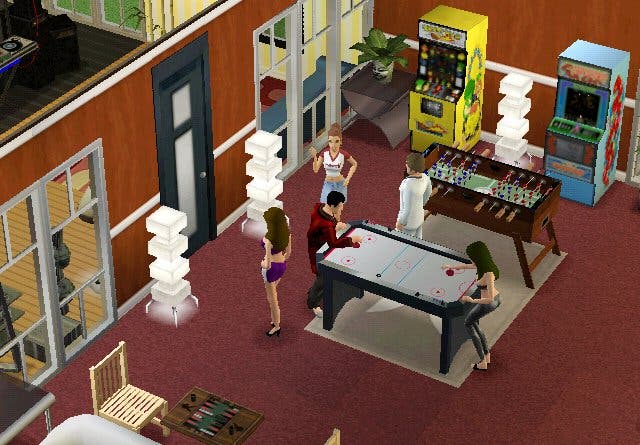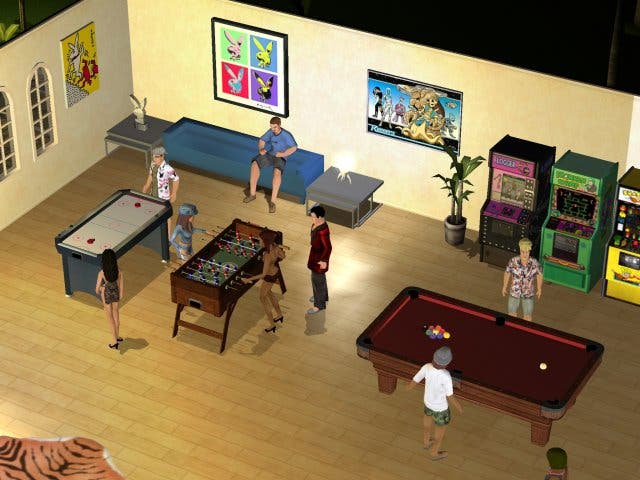Playboy: The Mansion
From High Def Gaming to Die Hef Gaming? For those of you who read the articles...
Order yours now from Simply Games.

You walk into every review with expectations. Basic critic's prejudice. With something like Playboy: The Mansion, this Sims-esque Hugh-Hefner-'em-up, you walk into the review buried alive in the things. Can't approach the work cleanly, which says something about humans but a lot more about the game.
Anyway, the plan was simple: I was going to rate the game purely on whether it got me off or not. It seemed the only way to be fair. Action games should be rated on how excited they make you. Strategy games should be rated by how much they make you think. Logically, games based upon the world's most famous soft-porn brand must be based upon per cubic centimetre of emissions produced.
It didn't end up like that, because - ultimately - Playboy isn't like that. In fact, if you wanted to tie an overarching theory to the game, you could argue that it's a cartoon-style documentary exposé about what it actually means to be Hugh Hefner. There's more to becoming one of the most famous Editors in the world than an endless line of identikit Californian blondes on your arm.
Though that does help.

The concept is simple. You are Hugh Hefner, either in a modern day or classic setting (or a sandbox mode without real objectives). You have to run your mansion and expand the Playboy Empire. To do this you mainly have to influence those that surround you, with mechanisms pretty much "borrowed" from the Sims. Relationships are defined across Romance, Business and Friendship scales. Interacting with guests satisfies their needs in these areas, makes them happier and more likely to either do what you want or - in the case of a paid employees - do what you want well.
In the campaign mode, you gain access to more of your mansion through completing objectives - normally of the "befriend X person" sort of thing - gaining money along the way, which can be spent to pay your ever expanding array of girlfriends and staff. Alternatively, you can use the spoils to purchase objects for the house that either help satisfy visitor's desires (such as a mini-bar to keep them entertained) or improve their skill levels (like an exercise machine to increase their fitness). Your main income is created by releasing issues of Playboy, which gain money depending on the quality of the content and how that content matches the world demographic.
Notice no real mention of sex yet, because, while there in huge quantities, it's not really what the game's about. Not that it's even vaguely approaching prudish. Would-be Hughs will be having (highly repetitive) sex with vast numbers of over-bosomy cartoon women. Polygamy is very much the rage. While in the Sims merely flirting with a passing person will annoy your lovers into a face-flapping rage, girlfriends will happily watch you have vigorous intercourse with their best friends, in the middle of a party with all their other mates present, with nary a raised eyebrow. However, while there are plenty of Sapphic adventures to be arranged, unsurprisingly there is no male homosexuality in Hef's world.

The real core of the game is influencing people and gaining money. After the initial understandable voyeuristic curiousness - and when you realise that sex is really quite tedious - the actual old penis/vagina thing is mostly a means to an end rather than the end itself. In fact, despite everyone being cheerfully more slutty than the relatively coy Sims and the actively frigid Singles, I found myself gravitating to lesser romance moves, such as kissing, to satisfy everyone's desires, simply because it took less time.
Playboy: The Mansion isn't just fodder for a bored wrist. It's an actual game. The problem is that, despite a fair array of quite interesting ideas - some of which are even its own rather than borrowed from Maxis - it's not a terribly good one.
The part that's remains interesting, and the reminder that Cyberlore are actually a real developer with some genuine design skills, is how you produce your magazines. Each issue of Playboy requires elements - a covergirl, a pictorial, an article, etc. To gather these, you have to utilise your social talents. Hire a journalist and tell them to write you something. Get a photographer and a girl, and talk the latter into doing a centrefold. Find a celebrity, smooth-talk them enough into either writing something for the mag or appearing on the cover if they're attractive and famous enough. Keep everyone as happy as possible when they're about to go to work, it'll probably result in higher quality. Try and hire the most expensive staff possible to secure their more highly honed talents. Increase in fame so the biggest celebs will come to your parties, where you can twist them around your little editorial finger.
It's not all deal-making, however. It also matters what manner of content you produce. Yes, it seems that people really do read it for the articles. The demographics are modelled, so you can tell if there are more people at any point who want to read about Sport than Music. If the Politics bar is high enough... well, maybe it's time to put the Mayor on as a covergirl.

Funnily enough, and in a deeply cartoony manner, this gleeful manipulation and calculation reminded me of the behaviour of the better editors I've worked under, men who I've seen happily manipulating celebrities, publishers and writers to provide the best material for the magazine. The only difference is that - say - Jim Flynn at PC Gamer never had sex with me on a couch to raise my spirits before I had to write an important piece, as I found myself regularly doing with the Staff Journalists of Playboy. Maybe it would have helped.
The problem is the problems. Functionally, the game is twitchy for a console release. The pathfinding is pretty abominable, with characters blocking each other and generally obstructing. That their movement speed is so relatively slow often leads to waiting while everyone disengages from their tasks to let you through. There's a smattering of bugs which really shouldn't be in a finished console game. For example, finding some guests getting trapped on a dancing machine until I interrupted them (though, since being on there for 15 minutes had maxed out their fitness, I wasn't exactly complaining). There are odd oversights in the interface, especially with moving furniture, where you have to clear everything off the top of a table before shunting it around. And if you have nowhere to put them... well, you can't move anything
.But centrally, its peer-manipulation rapidly becomes rote, with a similar progression of influential actions being enough to turn a complete stranger into a bosom buddy. It swiftly reaches a point where you swiftly see how you're meant to accomplish a task, leaving only the tedious clicking of its options to get there. This is made worse by some odd design decisions. Since your view is just tied to Hefner, whatever single conversation you're involved in is all you can observe. If you were able to skim and examine people's stats, as you can do when you aren't chatting, the slow pace would be several notches more bearable. As it is, being stuck watching the same animation you've seen before gradually removes the initial fascination.

And make no mistake, it's a compulsive game, in the same ways The Sims was. The mentioning of Will Wright's game so much is deliberate, by the way, to drive home exactly how much it takes. Funnily, out of the extremely few direct clones it provoked (at least, those not made by EA), it's the one that understands how the Sims operates best. It stands head and shoulders above real rubbish like Singles or that terrible office-based one which I'm not even going to give publicity to by looking up its name. It also, at least in a small way, understands the fantasy of what it's selling. Rather than Singles, where you spent six hours gradually trying to make one flatmate sleep with you, the parody lothario Pokémon Gotta-catch-'em-all is well explored. And, from the feminist perspective, it's clearly sexist, but manages to walk a line well clear of misogyny. This makes it more acceptable than genuine horrors like Leisure Suit Larry: Magna Cum Laude.
So, while the mechanics - bar the rough edges - are solid enough, the amount of entertainment is strictly limited. Sadly, as far as Sims clones go, it's actually one of the best... but you'd probably be better off going for one of its better expansion packs than spending money on this. It's just a little too slight a proposition for a full game.
If we return to the "Playboy: the Mansion as deconstruction of Playboy lifestyle" theory, perhaps this paucity and repetitiveness is just a critique of the real Hef? What started as a bit of a giggle becomes a drag. Decades of identical blonde women, your soul slowly crumbling beneath the fatal peroxide over-exposure... but that'd be reaching.
In conclusion: 5 cubic centimetres.
Order yours now from Simply Games.








